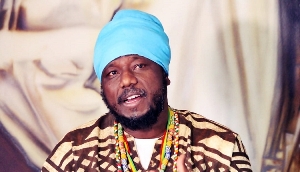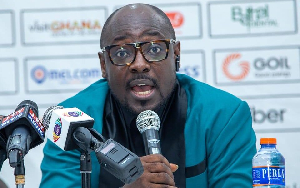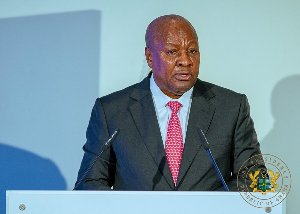Kojo Oppong-Nkrumah, the Minister of Information, has asked the Ghana Broadcasting Corporation (GBC) to clearly define its identity and make known its direction for growth.
He said the unclear identity made it difficult for GBC to meet the demands of the government and vice versa.
The Minister asked the management, staff, and members of the Public Service Workers Union of the Corporation to rethink if they wanted GBC to be a simpliciter, public service broadcaster, or public service broadcaster with subsidiaries that run commercials.
He said this when he paid a working visit to GBC on Wednesday to deliberate on better ways to enhance the operations of the Corporation.
The Minister said it was only when GBC developed a blueprint on how it wanted its future to be and where it wanted to be in the next couple of years, that government could know how much to invest in the Corporation at every point in time.
Mr Oppong-Nkrumah, who said the transformation of a public entity like GBC did not lie in the hands of a Minister or Board Chair but a collective approach, entreated the public service broadcaster to set up a committee that included representatives from the Public Service Workers Union possibly within 10 days to redesign the future of GBC.
The committee would assess the works done by the Corporation years back and currently and the challenges it faced amid media pluralism and digitisation to develop better ways to address them.
“GBC must adopt an attitude to work with all stakeholders to improve the system. You must agree that you are in a difficult situation. You have burnt wooden dilapidated buildings in your yard, some of which are death threats. There are even squatters here and it shouldn’t be so,” he said.
Mr Oppong-Nkrumah bemoaned the failure of public institutions like the Ministries to pay GBC for live coverage among others.
He said sometimes institutions like the Ministries fail to pay the GBC for live coverage when they might have hired satellites and others for the coverage leaving them with cost”.
Mr Yaw Boadu Ayeboafo, Chairman of the National Media Commission, called on staff of the Corporation to join forces with the Director-General to revitalise the institution.
He asked them to demonstrate that they wanted a GBC that was truly the “authentic voice of Ghana” with a common objective, even amid the financial and technical constraints. He said anything that the GBC engaged in had to fetch the institution some profit.
Mrs Cynthia Mamle Morrison, the Chairperson of the Parliamentary Select Committee on Communication, declared the support of the entire Committee for the state-owned media and gave an assurance to support the Minister to uplift the image of the GBC.
“I believe every one of you here has to demonstrate positively to uplift the image of GBC so that by its 90th birthday, it will be a new GBC,” she added.
Alhaji A. B. A. Fuseini, a ranking member on the Communications Committee, said “GBC today is like a bat, it is not a mammal and it is not a bird. When we are talking about a bird which flies, a bat is there and when we are talking about a mammal which has teeth and delivers, it is also there,” he said.
The committee, he said, had argued that the Ministry of finance gave GBC all of its internally generated funds to enable it to successfully and smoothly run its operations.
Professor Amin Alhassan, Director-General of the GBC, said GBC had internally put measures in place to transform the Corporation from bureaucracy to business, adding that they were going through systematic orientation to inject efficiencies in their operations.
He said the Corporation, however, required deliberate government intervention in some key areas such as the rehabilitation of the buildings, payment of electricity bills, and procuring of ultra-modern equipment.
The Director-General said GBC had procured two thousand buckets of paint and would soon commence a general painting exercise of offices nationwide.
Prof. Alhassan said one other key challenge of GBC was how to finance their long service awards, a situation that had become difficult to crack.
General News of Thursday, 29 April 2021
Source: GNA
Information Minister urges GBC to define identity and redesign future
Entertainment












